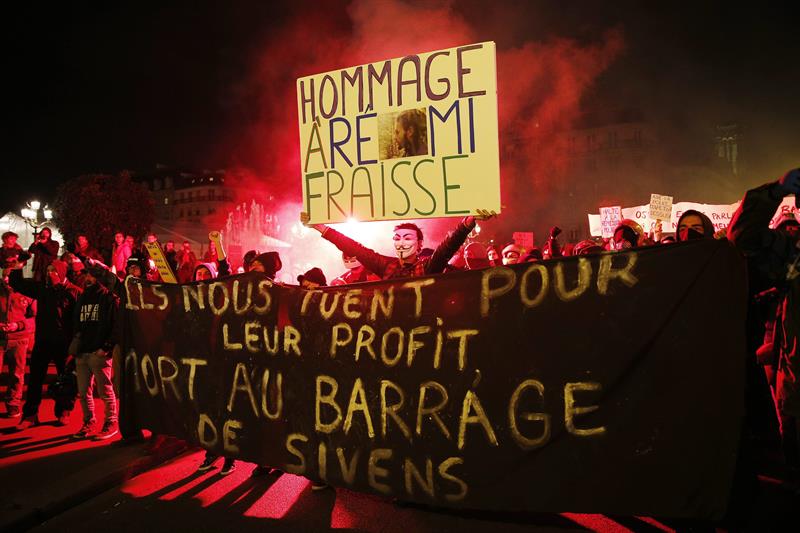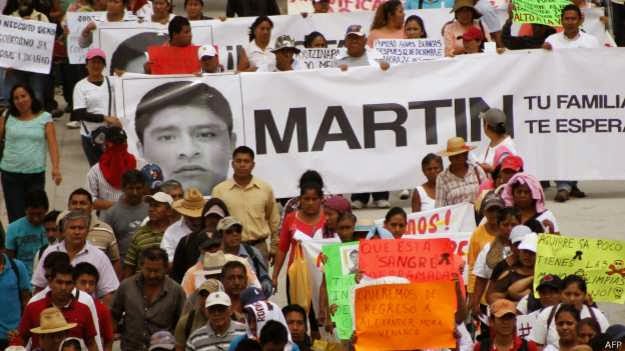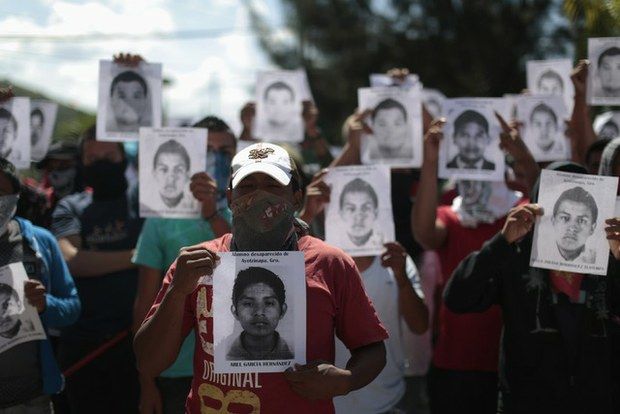Venezuela: In view of Maduro’s close victory
We must not allow imperialism to capitalize on the crisis of chavismo
18/04/2013
An unexpected and closed election result shook the country and has put the national situation in suspense. Nicolás Maduro hardly exceeded the candidate of the rightwing opposition, Capriles Radonski, by 272,865 votes, a very narrow margin, compared with the more than 1.5 million vote difference with which Chávez defeated Capriles in the presidential elections six months ago.
For that reason, the victory of Chávez’ chosen candidate, Nicolás Maduro, tastes of defeat, with 7,575,506 (50.78%), compared to Capriles’ 7,302,641 (48,95%), which is scarcely a 1.83% difference, the lowest in the history of chavismo. This time, it was not an election abstention phenomenon, since, in historic terms, it had high participation; rather Capriles Radonski practically pulled some 700,000 votes out of chavismo, compared to the October 2012 elections.... The outcome then fell like ice water on the chavistas themselves, who were thinking that the votes for Chávez would be automatically repeated for Maduro, but they made the political calculations badly, and they brought the surprise of the decade. For their part, Capriles and the MUD are now encouraged.
Political tension Ӭ
The political shock became an crisis, that opened up with the disregard of the election result by Capriles Radonski, who demanded the counting of all the ballot boxes, with the argument that there were abnormalities in the voting and even arguing that they won the elections. In this, he has the backing of US imperialism. But Nicolás Maduro has already been proclaimed as President by the National Election Council (CNE).
Capriles, who had called a march in repudiation of Maduro’s Inauguration for Wednesday, and, facing which, the government decided not to permit it, backed down on the call and decided to suspend the march, fearing that it would get out of control, in view of the real possibility that confrontations would be triggered that could get out of control, facing the government’s toughness. The situation has begun to become tense, but, for the time being, they are sizing up their forces, in order to reposition themselves politically in front of possible negotiations or agreements.
In the mobilizations that occurred in the afternoon and evening of Monday, April 15, called by Capriles to reject the proclamation of Maduro by the CNE and to demand the recount of the votes, attacks on some Barrio Adentro units took place, harassing or even damaging facilities of the health care centers. From the Liga de Trabajadores por el Socialismo (LTS), we categorically reject these reactionary and completely antipopular attacks, that even had hints of xenophobia towards the Cuban doctors that work there. We must confront that! The people, organized in the neighborhoods, calling assemblies, through open public discussions, must determine the ways to stop these attacks cold. The Barrio Adentro units, and the rest of the sports or educational facilities, if that were the case, are a social conquest of all the workers and poor people, and, as such, they must be defended! The defense of the public health centers does not, in any way, mean political support for the national government; we do not have to be with Maduro, to confront these attacks; it is a matter of a clear position of defending that which constitutes social conquests by working people and the poor, because of which, we are calling, in these specific cases, for a working-class and poor people’s united front, in order to stop these attacks, with the methods of the workers and the people, based on workers’ and popular democracy, in order to determine the political orientation and the actions to be taken, without necessarily implying subordination to the plan of mobilizations ordered by Maduro’s government.
Just like that, in actions with an obviously fascist style, there were groups that violently attacked chavista militants. The official organizations are talking about four or six people murdered by attacks of opposition groups. We emphatically reject these acts, and we repudiate the criminal activity of groups of the bourgeois opposition. Even when we know that chavismo in the government also encourages shock troops, for example, against some workers’ struggles or strikes, and it also makes use of young thugs, in order to intimidate, in no way can we endorse the murderous violence practiced by groups from the bourgeois opposition against militants of the government party, or against people who are defending the health care centers, created by the government. It would be different if we were talking about workers’, peasants’ or popular organizations, that are organized for self-defence and are confronting the government’s shock troops! If that were the case, we would undoubtedly be on the side of the workers’ and people’s fighting organizations, that want to restrain the young thugs or shock troops of the chavistas, but this is not the case; they are groups from a bourgeois opposition, that oppose the government from the right, that have made deadly attacks on chavista militants, and that same state of mind that encourages these right-wing hordes, can also be released tomorrow against the workers’ and popular struggles. For that reason, we totally reject these attacks and despicable murders.
Up to now, the armed forces have been defending the election result, and, in this sense, the high command recognizes Maduro as the country’s President-elect. During the Chávez period, basically after the defeat of the 2002 coup, the entire armed forces were a basic pillar in the regime and in the government, reaching a high politicization and even participating in key sectors of the government, through retired soldiers along with active soldiers, working in important positions and leading commands. But, in this post-chavista stage, nothing insures that, if the situation tends to become more tense, from the counting, divisions in the armed forces will not find expression, deepening the crisis. It is not accidental that some daily paper headlines are writing that the “FANB [Venezuelan armed forces] is the power that supports the election results,” not only because of the backing given to the National Election Council (CNE) and to the President-elect himself, but also because they are the ones who have the ballot boxes in their custody. Maduro does not have Chávez’ authority, in case of a possible division of the Armed Forces.
In the election, the right wing capitalized on the crisis of chavismo
The MUD opposition, with Capriles at its head, got a big portion of the population to change a political choice, in a framework of big polarization, at the same pace with which Maduro was losing voters.... Obviously, Maduro is not Chávez. Moreover, the critical situation of the economy led the government to take anti-popular and anti-worker measures right in the election period: in less than one hundred days in charge of the interim government, Maduro imposed two strong devaluations of the currency, which became quickly felt with the direct increase of prices of mass consumption goods.
Although chavismo won in the big popular districts of the main cities, as, for instance, in populous Catia and in the poorest parts of Petare of Greater Caracas, the fall in votes in these regions became noticed, and the same phenomenon was observed in big concentrations of workers, as in the states of Aragua and Carabobo, and cities like Guayana, a center of the big basic industries, but not exactly because of abstention; rather, almost to the same extent that votes for Maduro fell, those for Capriles were increasing.
Internal tensions in chavismo and the opposition
Although initially chavismo had closed ranks behind Maduro’s candidacy, the unfavorable election result will open up a crisis among the different factions of chavismo. The sentence of Diosdado Cabello himself, calling “on the chavista leadership to seek the faults, even under the rocks, and a profound self-criticism which these results require,” was not directed solely at reviewing their political “errors,” but also at settling internal scores, that would indicate increasing the internal division, although for the moment, and because of the new situation that has opened up, unity will be maintained, because of the onslaughts by the rightists.
... But the internal tensions that could develop inside the PSUV will not only come between the different existing factions, but also from the very grassroots of chavismo, that, tired of following the senior bureaucrats like a caboose, will be able to go out more forcefully, to protest because of what has been denied them, and they will demand that left-wing measures be taken, in the face of the new economic and political situation.
Among the rightists, for their part, although now they are emboldened by the election outcome, and Capriles has turned into a leading figure of the opposition, not everything is “unity.” Capriles is established on some foundations and a political alliance that he does not control to his liking, and he has to struggle among its different components.... The most violent actions that were expressed in the first two days after Sunday’s elections and after Capriles’ appeals that “the members of the opposition should go home,” can express these internal differences. But it is indeed obvious that the opposition that had experienced two consecutive political defeats in the elections for President and the gubernatorial elections, has gotten back on its feet, even in order to arrive at the level of challenging the national government with not recognizing the elections.
A weak government
Events show that the transition to a post-chavista stage will be traumatic.
(…) Maduro will have to wrestle not only with an emboldened opposition, but also with the fights inside chavismo itself. But basically he will be subjected, undoubtedly, to resistance from groups of the working class that will go out more strongly to fight for their demands and for better living conditions....
On the international level, Maduro’s government, at the moment, also confronts the post-chavista stage with difficulty. Most of the governments of Latin America have come out to back the election result and Maduro’s victory; some did it quickly, like Brazil, Argentina, Uruguay, Cuba, Nicaragua and Ecuador, and even more distant countries, like China and Russia, based on their national interests. The United States is trying to use the crisis to its advantage, echoing the policy of its friend Capriles, and, together with other imperialist countries like France and England, has, up to now, refused to recognize Maduro’s government.
The policy of the United States will be to pressure Maduro’s government to adopt a position more open to negotiation, in the framework of which, even when Chávez was alive, the Venezuelan regime had to begun to make moves towards a better understanding with the United States (like recognition of the post-coup regime in Honduras and close collaboration with Santos in Colombia), and, more recently, members of Maduro’s interim government met with representatives from Washington, seeking to improve relationships with the incoming real government. For their part, countries like Brazil and Argentina will surely be the ones that will have a policy of giving more stability to Maduro’s government, taking into account not only their own economic and geopolitical interests, but also because destabilization in Venezuela would have negative repercussions for all of Latin America.
At the present political moment, a national emergency meeting of workers is necessary
In view of the crisis that has opened up, the working class and the groups of the poor must actively repudiate the imperialist interference of the United States, that is refusing to recognize Maduro’s government and encouraging the bosses’ opposition of Capriles. But this does not mean giving any political support to Maduro.
The working class cannot get stuck in choosing between the options that the bourgeois leadership of the country is fighting over, nor can it get paralyzed in waiting for what one or another gang is doing: the government with the devaluations, the refusal to discuss collective contracts, and the criminalization of the workers’ struggles, and the pro-imperialist opposition that is hawking a capitalism “without restrictions,” and bigger “freedoms” for the exploiters. Far from following one or another band, from waiting for what one or another group will decide, we must work hard by joining together, getting coordinated and discussing, as a social class, our problems and those of the country.
... This perspective is not flourishing now, among other reasons, because of the influence of the bureaucratic union leaderships, that, far from proposing a line of political independence of the working class, are part of the main bourgeois political projects in conflict, for which they lead the workers behind one or another faction of the current order, or simply condemn the workers to passivity in front of a crisis of dimensions like the current one. For that reason, it is important to open up this discussion in all the workplaces and to make demands on the union leaderships, that possess the resources and the possibilities of promoting a policy in this sense.
A national emergency meeting of workers, that will bring up the struggle against all imperialist interference and will give a response as a class, in view of the current crisis and the economic and social reality of the country, that is being unloaded on the wages and rights of workers .... A meeting with men and women delegates that can be removed, voted on in assemblies in each workplace .... and open to the entire rank and file of the workers, without any type of previous requirement, other than that of being a worker, without any precondition of having or not having a certain political eligibility, based on the clearest workers’ democracy, with freedom of opinion and discussion.
The union leaderships have the main responsibility for promoting or preventing a meeting with these characteristics. Especially those that now proclaim themselves to be autonomous, in relation to the employers’ factions in conflict; we are referring to the groups of the National Union of Workers (UNT), led by Marcela Máspero and Eduardo Sánchez, and the C-CURA tendency, within the FADESS, whose political leaders are Orlando Chirino and José Bodas, who recently signed a statement calling for a united front of the workers, to fight for our demands, independently of the opposition and the government. If these statements of intentions are real, these leaderships have to take the lead in calling an emergency workers’ meeting, like the one that is proposed here. Where there are even conditions for setting regional meetings, by city, or by branch of production, we must encourage them, in order to take real steps on the road to this national meeting.
... It is a discussion that we are suggesting to the men and women worker comrades, that we will open up in the workplaces, that we will discuss with this perspective, in order to advance to a policy of class independence, with a perspective that belongs to the workers, that, by trusting in our own methods of struggle, in our own forces, in our own leaders in struggle, will give us much better prospects than those which the government and the opposition, that want us thinking only about the prospects that each one of them offers us, are currently leading us to.
For the political independence of the workers, we must construct a political instrument of the workers
The dissatisfaction of groups of the working people with the reality that we have been living through for almost a decade and a half of alleged “revolution,” shows the failure of bourgeois nationalism, that Nicolás Maduro now says he will continue.
But this dissatisfaction cannot be progressively channeled through the project that Capriles Radonski represents, but rather by turning towards a class political alternative, belonging to the workers. In these elections we have seen how some groups of workers and of poor people, facing dissatisfaction with chavismo, cast their vote for another version from the bosses, like that of Capriles, precisely because the workers at this point have not forged their own political instrument that will fight for class independence. We consider that, facing this phenomenon of dissatisfaction and the processes of a breakup that are beginning to occur in chavismo, and that will surely accelerate with Maduro’s government, the task of revolutionaries, now more than ever, is to fight with all their strength, for the construction of their own political instrument, a party that belongs to the workers, with a clear program of a workers’ solution to the crisis and for class independence.
The working men and women of the country, that we constitute, with some 7,000,000 male and female wage earners, the biggest social class of the country and, potentially, the most powerful, that, daily and constantly, carries on its shoulders the production of the immense majority of the wealth, the class that makes the wheels of the country turn, must create its own spaces for meeting, discussion and decisions about politics and struggle. The working class will have to conquer its own political independence, both in facing the right wing, and in front of the different versions of chavismo, now with Maduro and his milieu, in order to become a political factor, that will be able to respond to the current situation, by avoiding being a caboose of one of the bourgeois projects that the country’s leadership is now fighting over. A political instrument belonging to the workers would provide the way to the construction of a revolutionary and internationalist workers’ party, that will lead the struggle to the end, since there will be no solution to the fundamental demands, unless it is in the resolute fight, with the perspective of a struggle for a government that belongs to the workers and the poor, on the basis of the destruction of the bourgeois state and the abolition of capitalist private property, both national and imperialist, putting the social wealth at the service of the majorities, of those who produce it, as part of the struggle for the defeat of capitalism, on an international, world scale.
04/17/2013
Translated by Yosef M.








![Declaration of the Movimiento de los Trabajadores Socialistas [MTS] facing the brutal murder and disappearance of the normalistas students of Ayotzinapa](http://www.ft-ci.org/IMG/arton8590.jpg?1687978277)











